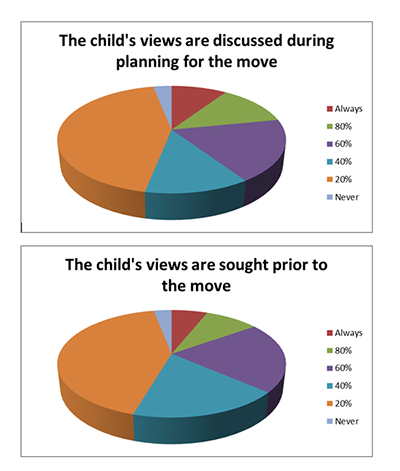We recently invited our Charter Champions to complete a survey on placement change and 44 responded. As you can see from the results (left), opinions on how often children’s views about changes of placement were asked for and how much they were discussed vary from ‘Always’ to ‘Never’.
Who is right? Or does this range of views indicate some fundamental differences of understanding or definition?
The survey results also suggest that the seeking and discussion of children’s views about placement change is not the norm. Is that really the case?
The initial impression from our recent review of 100 case files is that the views of children are not frequently recorded, at least in the case files. However, we know that case files are sometimes not complete. Is it the situation that the childrens’ views are more often sought and discussed than recorded but we lack the evidence to demonstrate it?
Gathering the views of children in an integral part of social work practice. Are you able to share techniques that work with different age groups as some of our survey respondents suggest? What role do carers, teachers or other workers have in finding out and reporting the child’s views and how can their views be gathered?
We welcome your comments which will appear after short period for moderation.
We also Tweet about issues for children in care.


2 Responses
Within our organisation we respond to childrens needs and address the child of having rights to express how they feel while being in care. Babies are a little more difficult although seeing the attachment they have with parents and presentation gernally shows how a child is feeling by expressing emotions and wellbeing.
Ways of gathering information is gathered through out programming activities emotions, and protective behaviours. Children relate to how they like being treated and what they dont like about certain situations.
Thank you
Amanda
We [the Foster Care Association NSW] work with many NGOs and carers; we find that where the carers and children are given the opportunity to give an opinion and a chance to speak, there is communication and everyone understands how each party feels even if they are not totally happy with the change.
However, where the decision is made at a desk and there is no opportunity for the parties involved including the foster carer and the children, there is a lot of heart ache, despair, anguish and pain. Then they have the added complication of not being prepared, emotions running over and no where to put their love and their grief.
A simple conversation with the carer can solve so many problems, and make communication clear, we appeal to the NGOs to make this a part of the process, so that carers are not damaged beyond repair during the process. Of course we deal with these issues when there are problems, so we also acknowledge that many NGOs do make a concerted effort to include carers and for this we acknowledge them and recognise their good work.